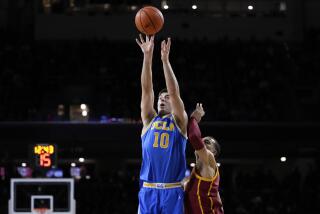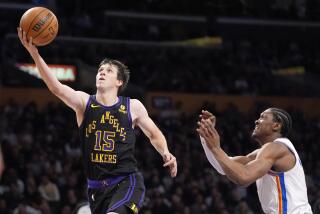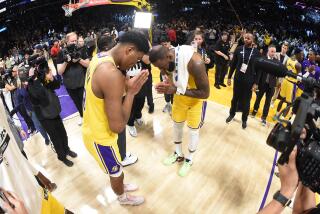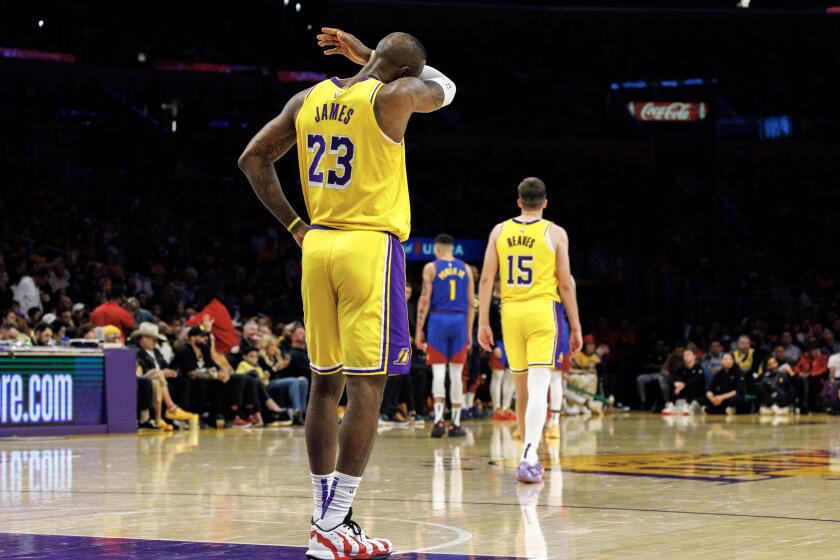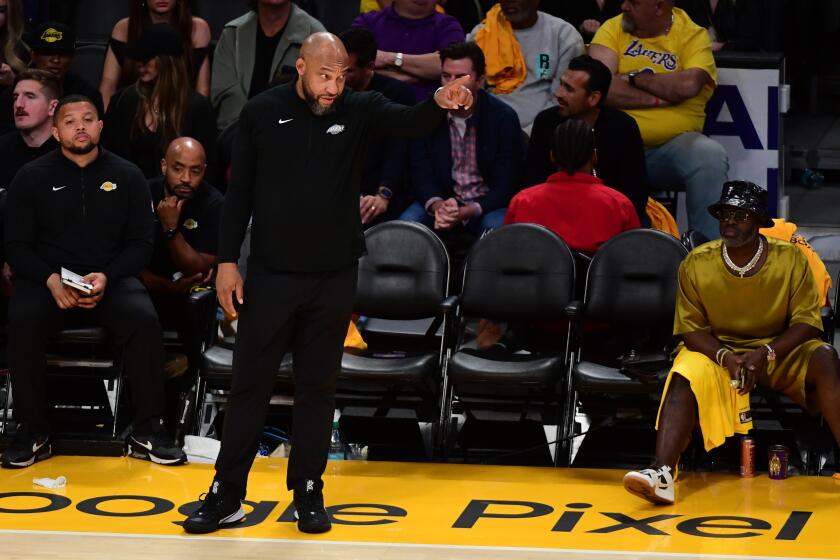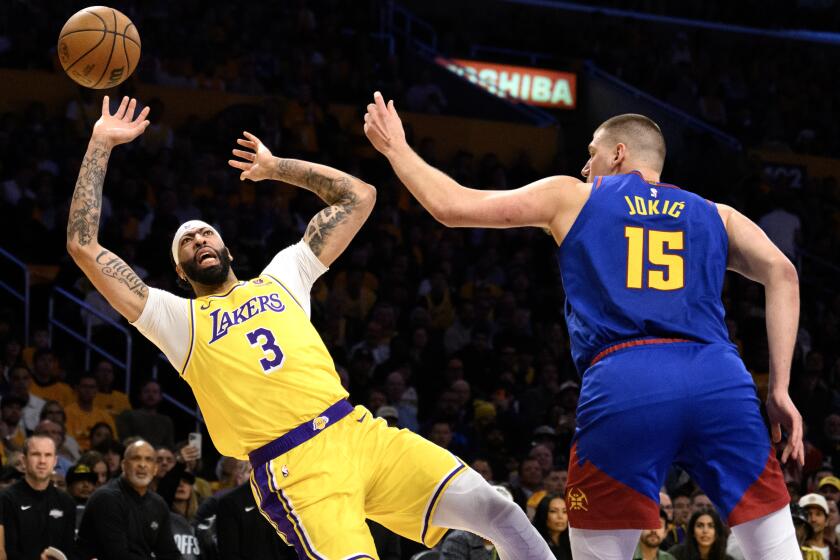Lakers assistant Brian Keefe helps school young pros, and Kevin Durant sings his praises
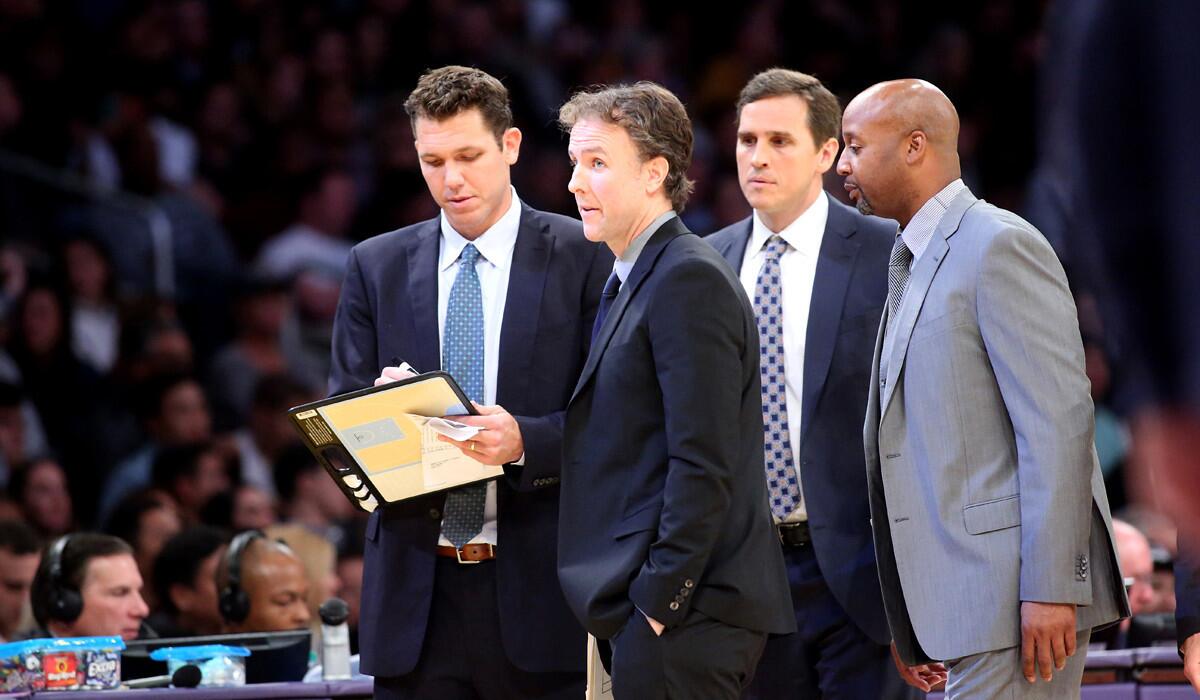
Before each game they worked together on the court, reaching for the same goal.
A skinny 6-foot-9 forward — a teenager who was a second overall pick — and a coach tasked with his development. The player was given a schedule to create a routine so he could learn habits that would stay with him throughout his career.
That’s the story of Lakers assistant Brian Keefe and Brandon Ingram.
It’s also the story of then-SuperSonics/Thunder assistant Brian Keefe and Kevin Durant.
“Taught me everything I know,” said Durant, a seven-time All-Star and league most valuable player in the 2013-14 season. “About work ethic, being a pro. He wouldn’t take any credit for it, but he taught me everything I know as far as how to approach shoot-arounds, practices, games, workout sessions.”
That was no accident then, and it’s no accident now.
Durant was the first of three consecutive lottery picks selected by the Seattle SuperSonics/Oklahoma City Thunder organization, and all three — Durant (now with the Golden State Warriors), Russell Westbrook and James Harden (who’s now with the Houston Rockets) — became superstars. They made a Finals appearance together, three years after winning 43 games in two seasons. They succeeded in part because of their superlative talent, but also because they learned very early in their careers what kind of work and routine is required to get there. Their extra work was scheduled and they got individual attention that expanded their games.
It’s a model that the Lakers are now following, one that Lakers Coach Luke Walton embraces as well, and that Keefe is helping them implement.
“They had a very similar situation with a young Durant, a young Westbrook and trying to build,” Walton said. “Their philosophy was ‘Let’s spend as much time and effort as we can developing these players on and off the court.’ … [Keefe] has experience at how to do that. It was a big reason why, besides all his references that spoke so highly of him, that we wanted him here.”
Keefe will take no credit — for himself or the Thunder staff — for what Durant, Westbrook and Harden became.
“Trust me, we had very little to do with this,” Keefe said. “Once they learned to have their own habits, it just became part of who they were. And then when all these other guys came into the organization they saw it. So it became the whole, kind of, culture of the place. … You’ve probably heard that a million times from coach here. It’s really all the same.”
But they had to start somewhere, and the staff offered a road map.
Each player, was put on a schedule for extra work with assistant coaches — even the veterans. In their time slots they’d work with parts of their game, be that shooting, ballhandling, defensive concepts or whatever else needed work.
The structure extended to routines with the strength and conditioning staff and medical staff. Off the court, they had activities designed to develop them as people.
“The biggest thing was just trying to make all the young guys become pros,” said Nick Collison, a 2003 first-round pick, who has spent his entire career with the Thunder and Sonics.
Collison’s entry into the league predated that of the regime that brought in Durant, Westbrook and Harden. He often wonders how his career trajectory might have been different if he had the structure that came later. He saw the way work with coaches, especially Keefe, added dimensions to each player’s games.
“Like when Kevin started, he had all this talent and ability and trying to figure out how it works in an NBA game,” Collison said. “The way he can handle the ball and play in pick-and-roll and come off screens. He’s almost 7 feet tall. He wasn’t able to do that when he first got in the league.”
He saw Westbrook’s pace improve, and his ability to see passes develop.
The fruits of the extra labor became obvious to everyone. As they did, that extra work just became part of the organization’s culture. Success became a strong motivator. Westbrook, whose face brightened at the mention of Keefe’s name, still goes in early to shoot, just as he used to under his schedule as a young player.
“That’s a part of what we stand for here,” Westbrook said. “That’s a part of Oklahoma City. To be able to come in and compete at a high level, you gotta work for everything.”
The Lakers now find themselves with three consecutive lottery picks — Julius Randle, D’Angelo Russell and Brandon Ingram — just as the Thunder drafted Durant, Westbrook and Harden in consecutive lotteries. The Lakers’ future depends on the development of those young players, just as the Thunder’s did.
The Lakers have brought in speakers, not only the team’s former greats, but also others such as retired football player Ray Lewis, to talk to players about life experiences. They have activities for the players on the road, organized by director of player development Rondre Jackson, to expand their cultural understanding.
It fits Walton’s vision, and Keefe has offered insight.
Working with Durant served as a learning experience for Keefe too.
“We spent a lot of time together,” Keefe said. “I was with him a long time. Just that trust that he knew I was there to help him. He probably helped me a lot more.”
Now Keefe uses that experience to help Ingram.
“He’s told stories to me about them, how they would be coming in early in the morning, getting extra work in,” Ingram said. “He knows what it takes to get to that level. I just listen.”
If he needs more motivation, Durant’s words might suffice.
“Met him when I was 18,” Durant said. “From 18 probably to 25, he’s been grooming me into the player that I am today. I owe a lot to him. He probably wouldn’t take the credit, but he’s been one of the most influential guys that I know in this business and in life.”
tania.ganguli@latimes.com
Twitter: @taniaganguli
More to Read
All things Lakers, all the time.
Get all the Lakers news you need in Dan Woike's weekly newsletter.
You may occasionally receive promotional content from the Los Angeles Times.
